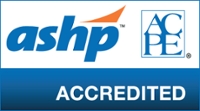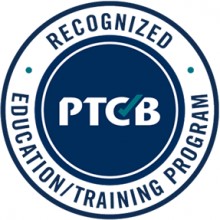Pharmacy Technology
Join the exciting world of pharmacy technology! We offer training on state-of-the-art equipment such as Pioneer Rx software, modular clean room with a laminar flow hood, and a Med Dispense machine in a fully functional simulation lab environment. Explore the multiple career options for pharmacy technicians including retail pharmacy, hospital pharmacy, mail order, assisted living, home health, nuclear medicine, and medical insurance. Learn through interactive, hands-on experience in a lab, as well as experiential rotations through local pharmacies. This program is accredited through the American Society of Health Systems Pharmacists (ASHP) and will prepare you for the exam to become nationally certified through the Pharmacy Technician Certification Board (PTCB).


The Pharmacy Technology Program at Guilford Technical Community College is accredited by ASHP/ACPE Pharmacy Technician Program Accreditation and the Pharmacy Technician Certification Board.
The program is now recognized by the Pharmacy Technician Certification Board (PTCB) as an educational program for technicians who wish to apply for the Certified Sterile Products Technician (CSPT) Program. For more information, please visit the PTCB website.
| Completion Rate | Employment Rate | National Certification Pass Rate | |
|---|---|---|---|
| 2021 | 79 | 100 | 100 |
| 2022 | 88 | 100 | 100 |
| 2023 | 94 | 100 | 100 |
Admission Information
- Fall 2026 Pharmacy Technology Diploma Admission Packet [PDF]
- Fall 2026 Pharmacy Technology AAS Bridge Admission Packet [PDF]
For program admission information, please contact:
Jennifer A. Clark
Guided Entry Program Advisor / Career Coach
Guilford Technical Community College
Hassell Health Technologies Center, Room 130
Phone: 336-334-4822, ext. 50859
Email: jaclark6@gtcc.edu
Michael A. Fairley
Guided Entry Advisor/Career Coach
Guilford Technical Community College
Hassell Health Technologies, Room 118
Phone: 336-334-4822, ext. 50769
Email: mfairley@gtcc.edu
Credentialing Options
Frequently Asked Questions
The Pharmacy Technology Program is a limited enrollment program that only accepts 20 students. All students begin as diploma level students.
Students interested in applying to this program should contact the Guided Entry Office 336-334‐4822, ext. 50439 guidedentry@gtcc.edu for more information.
After applying to the program, the Guided Entry office will notify students of acceptance and when orientation will take place for course registration. Students must attend a mandatory program orientation that is separate from the college orientation. During the program orientation, students will be advised on how to register for classes and receive information on completing the required drug testing and criminal background check.
Students can take any of the general education requirements such as math and English before acceptance into the program.
The Pharmacy Technology Program is on the High Point Campus.
Yes. Clinical rotations take place in the spring semester at local pharmacies. You are required to have a criminal background check and drug test before being placed in a clinic. The clinic sites also require that you have the flu vaccine.
This is a hybrid program with some classes and labs on campus and some online. The clinic rotations must be completed on-site at a local pharmacy.

to have Pioneer Rx
as a training tool
in our pharmacy lab.
The pharmacy program partners with PioneerRx, the top pharmacy management system in the industry. PioneerRx enhances our curriculum with a hands-on approach to learning that simulates the functions and workflow of today’s most innovative pharmacies. For more information, visit https://www.pioneerrx.com/.
See how PioneerRx compares to other pharmacy software vendors at Pharmacy Software Reviews website.

